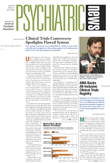In 2003, on the recommendation of the Office of the Inspector General (OIG) in the Department of Health and Human Services, a contractor (Advance Med) was hired to review a sampling of paid Medicare claims as part of a program called Comprehensive Error Rate Testing, or CERT.
Prior to 2003, the OIG estimated the Medicare fee-for-service (FFS) error rate on an annual sampling of approximately 6,000 claims. The small size of the sample allowed the OIG to make only a rough estimate of what the national FFS paid-claims error rate was, and the OIG was unable to categorize error rates by type of service, provider, or contractor.
In its first year, the CERT had a sample of 128,342, approximately 20 times larger than the sample the OIG had previously reviewed. The number of reviewed claims is expected to remain in this range. Advance Med has developed a method for randomly selecting claims that it asserts provide an accurate picture of what is occurring throughout the universe of Medicare claims.
Under CERT the Medicare world is divided into 60 clusters (based on contractors and geographic locations), and 2,000 claims are reviewed from each cluster based on “systematic random sampling.” This means that if 4 percent of all Medicare claims in a region are for psychiatric services, 4 percent of the claims CERT reviews from that region should also be for psychiatric services. The Medicare fiscal intermediaries (FIs) and carriers that paid the claims don't know which claims have been selected.
Based on the way the sampling is done, APA was told that it is highly unlikely that any psychiatrist (or any other Medicare provider) would receive a request for more than one claim as part of CERT. However, if there is more than one encounter on the claim, psychiatrists will be asked for documentation for all of the sessions that were billed for on that claim.
If you receive a request from the CERT Operations Center for a patient record, you should do everything you can to comply. If you fail to send the information requested, the claim for which the record was requested will be denied, and your Medicare contractor will tell you to return any payment you received based on the claim. You have the right to appeal just as you would for any denied claim. The CERT contractor also may refer the claim to your Medicare carrier's fraud unit and to the OIG, although it is unclear whether this will be done routinely.
If one of your claims is selected to be reviewed as part of CERT, you will be asked to provide a complete record. However, under the Health Insurance Portability and Accountability Act (HIPAA) privacy rule, your psychotherapy notes do not have to be given for this review as long as you have maintained them separately from the rest of the patient's medical record (i.e., on a separate piece of paper). It is important to note that psychotherapy notes are specifically defined under HIPAA as “notes recorded (in any medium) by a health care provider who is a mental health professional documenting or analyzing the contents of conversation during a private counseling session or a group, joint, or family counseling session and that are separated from the rest of the individual's medical record.”
The following are not considered to be part of psychotherapy notes:“ medication prescription and monitoring, counseling session start and stop times, the modalities and frequencies of treatment furnished, results of clinical tests, and any summary of the following items: diagnosis, functional status, the treatment plan, symptoms, prognosis, and progress to date.”
If your psychotherapy notes are kept separately, as required by HIPAA, you should have no problem sending the CERT contractor the full record requested without these notes. If your notes are intertwined with the rest of the patient record, they do not have the protection offered to psychotherapy notes and must be tendered with the rest of the patient record.
A report of CERT findings, primarily dealing with Part B payments, was published in December 2003 (a short version of this report can be downloaded at<www.cms.hhs.gov/providers/psc/Medicare-Error-Rate-Short-Report.pdf>). A report will be published in November that analyzes Part A error rates. The goal of CERT is to get the fee-for-service error rate down to 4 percent by 2008 (in the last two years it was 6.3 percent).
For more information, contact APA's Managed Care Help Line at (800) 343-4671. ▪
